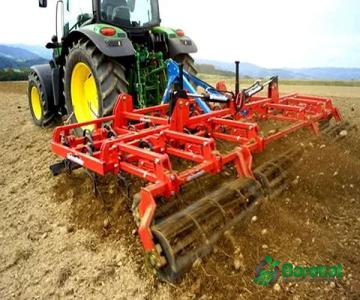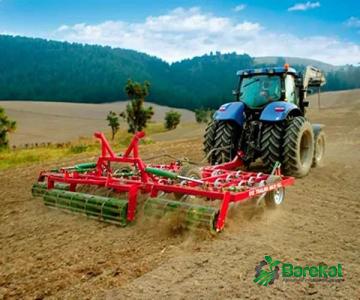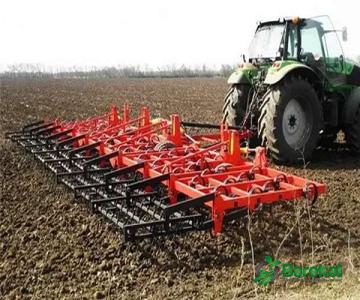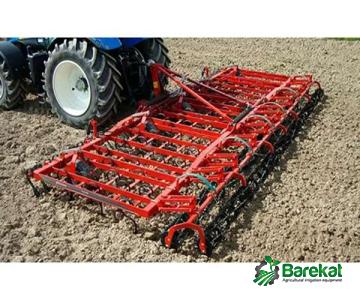As the agriculture industry continues to adopt innovations in technology, battery-powered equipment is becoming increasingly popular. Battery cultivators, in particular, are revolutionizing the way farmers tend to their crops. With their numerous advantages over traditional cultivators, battery-powered options are proving to be a game-changer for efficient and sustainable farming practices. This article will explore the benefits of battery cultivators and how they can positively impact farming operations. 1. Portability and ease of use: Battery cultivators are lightweight, compact, and easy to maneuver. Unlike their gas-powered counterparts, they do not require the use of fuel or oil, making them significantly easier to operate. This convenience allows farmers to navigate through narrow rows and expansive fields effortlessly.

.
 Their compact size also reduces the risk of soil compaction, enabling farmers to tend to their crops without causing damage. 2. Environmental sustainability: One of the primary advantages of battery cultivators is their eco-friendliness. By eliminating the need for fossil fuels, these cultivators produce zero emissions, reducing the carbon footprint associated with traditional alternatives. This sustainable approach aligns with the growing demand for eco-friendly farming practices. Farmers can cultivate their fields without harming the environment or compromising the quality of their crops. 3. Noise reduction: Farmers often have to work with heavy-duty machinery that generates excessive noise. Battery cultivators, on the other hand, are significantly quieter, creating a more peaceful farming environment. This reduction in noise pollution benefits both the farmers and nearby communities. Silent operation enables farmers to work early in the morning or late at night, without disturbing their neighbors.
Their compact size also reduces the risk of soil compaction, enabling farmers to tend to their crops without causing damage. 2. Environmental sustainability: One of the primary advantages of battery cultivators is their eco-friendliness. By eliminating the need for fossil fuels, these cultivators produce zero emissions, reducing the carbon footprint associated with traditional alternatives. This sustainable approach aligns with the growing demand for eco-friendly farming practices. Farmers can cultivate their fields without harming the environment or compromising the quality of their crops. 3. Noise reduction: Farmers often have to work with heavy-duty machinery that generates excessive noise. Battery cultivators, on the other hand, are significantly quieter, creating a more peaceful farming environment. This reduction in noise pollution benefits both the farmers and nearby communities. Silent operation enables farmers to work early in the morning or late at night, without disturbing their neighbors.
..
 Furthermore, reduced noise levels are less stressful for livestock and wildlife living on the farm. 4. Cost-effectiveness: While the initial investment in a battery cultivator may be higher compared to traditional models, the long-term financial benefits are significant. Battery-powered models require less maintenance and have lower operating costs. Eliminating the need for fuel, oil changes, and spark plug replacements saves farmers considerable expenses over time. Additionally, many battery cultivators have a longer lifespan than their gas-powered counterparts, further maximizing their value for money. 5. Increased productivity: Battery cultivators offer efficient power distribution, delivering consistent performance. With variable speed settings and adjustable tilling depths, these cultivators allow farmers to tailor their work according to specific crop requirements. This precision improves productivity by ensuring even and thorough soil cultivation. Moreover, battery-powered cultivators require minimal downtime for recharging, allowing for continuous work throughout the day.
Furthermore, reduced noise levels are less stressful for livestock and wildlife living on the farm. 4. Cost-effectiveness: While the initial investment in a battery cultivator may be higher compared to traditional models, the long-term financial benefits are significant. Battery-powered models require less maintenance and have lower operating costs. Eliminating the need for fuel, oil changes, and spark plug replacements saves farmers considerable expenses over time. Additionally, many battery cultivators have a longer lifespan than their gas-powered counterparts, further maximizing their value for money. 5. Increased productivity: Battery cultivators offer efficient power distribution, delivering consistent performance. With variable speed settings and adjustable tilling depths, these cultivators allow farmers to tailor their work according to specific crop requirements. This precision improves productivity by ensuring even and thorough soil cultivation. Moreover, battery-powered cultivators require minimal downtime for recharging, allowing for continuous work throughout the day.
…
 Conclusion: The introduction of battery cultivators has revolutionized the way farmers approach soil cultivation. The portability, eco-friendliness, noise reduction, cost-effectiveness, and increased productivity provided by these innovative tools are reshaping the agricultural landscape. By incorporating battery cultivators into their farming practices, farmers can enhance efficiency, reduce environmental impact, and optimize crop yield. As technology continues to evolve, battery cultivators are emerging as a reliable solution to improve farming practices while addressing sustainability concerns.
Conclusion: The introduction of battery cultivators has revolutionized the way farmers approach soil cultivation. The portability, eco-friendliness, noise reduction, cost-effectiveness, and increased productivity provided by these innovative tools are reshaping the agricultural landscape. By incorporating battery cultivators into their farming practices, farmers can enhance efficiency, reduce environmental impact, and optimize crop yield. As technology continues to evolve, battery cultivators are emerging as a reliable solution to improve farming practices while addressing sustainability concerns.










Your comment submitted.